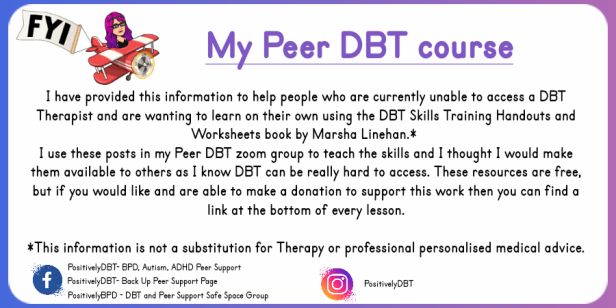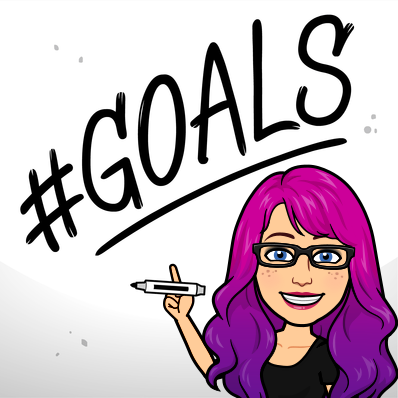
Handout on page 124
Clarifying your goals and priorities is the most important part of Interpersonal skills, as to be effective you need to know what you want from the interaction. The other important part of clarifying your goals is working out how important your objective is in comparison to your relationship with the person and also your self-respect. Your goals for the situation will determine which skills are going to be the most effective.
***Interpersonal Skills and Masking*** – I have heard that some autistic people feel that this part of DBT promotes masking and so I just wanted to touch on that for a moment. The next 3 skills we are covering will be scripts, and ways to communicate to get the most effective outcome for yourself. This is not about people pleasing or pretending to be something that you are not and I hope that this post helps anyone who is worried to see these are tools for you. These skills are a guideline to help you to be more effective and as with all the skills, it’s up to you how much and when you use them. When I first learnt the scrips I felt that it did feel fake and robotic, but I have found that over the years, as I have been able to learn them it’s got more natural. Now when I use these skills it doesn’t need to be so formal (unless I’m really struggling to get my point across.) I make sure that I keep the skills in mind in interactions and keep my goal in mind and this has been really helpful.
This is the part of DBT that I struggled the most with as it felt like a lot to get my head around so we are going to go slowly over the next few weeks and cover one skill at a time to give you the best chance at understanding and learning them. When we do the second round we will recap them a bit quicker if everyone has a good understanding of them.
The handout for clarifying goals in interpersonal situations is on page 124.
Why do we need goals?

Without clear goals, interactions can get off track and we can lose focus on what we wanted and get distracted.
Group discussion – I would like you to think back to a time when you had an interaction where you did not have a clear goal and also to a time when you had a clear goal for an interaction. How did these interactions differ from each other? Was one more effective than the other?
Sometimes our emotions can get in the way and influence how we behave in an interaction. Anxiety, shame and fear could all be emotions that get in the way of asking for something that you need or saying no to something. Emotions can also crop up in interactions making staying on point more challenging, this is another reason having clear goals to turn your mind back to is important if you want to be effective.
*Examples from teaching book
Group discussion – Think of a time when you had an interaction with someone and even though you know what you wanted an emotion got in the way of asking or saying no. What was the emotion that got in the way?
The three goals in interpersonal situations

In this lesson we are specifically focusing on the 3 goals that DBT gives us for interpersonal situations, you may have your own more personal goal for the interaction but before you move on to that we need to work out which of the following 3 things are the most important:
*Your objective in the situation
*Your relationship with the person
*Maintaining your self-respect
Objective effectiveness

Your objective is the thing that you want from the interaction.
Your objective could be asking for something specific from another person, for example asking someone to do something for you, to stop doing something, to understand your point of view or to agree to something. It could also be saying no to something that you do not want to do.
There are many times in our lives when our objectives are the reasons for the interaction in the first place. For example, if we are calling for a doctor’s appointment, in this situation we are focused on getting the appointment as the desired outcome of the interaction. Although we still need to think about our self-respect and how we are asking for what we want, we do not have a relationship to preserve and so the objective is the most important thing.
Marsha says when your objective is the priority it’s important to ask yourself “What specific result or change do I want from the interaction?”
It is important to be specific with your goals as this will help you to have a clear idea about what you want going into the interaction, so you can have the best chance at using your skills and being effective in the situation.
*Teaching note – Examples – Ask the group to add more?
Relationship Effectiveness

When choosing the relationship as the most important part we are not side-lining our goals and only focusing on the relationship, instead, we are still moving towards our goals but with more awareness and care to maintain or improve our relationship with the person at the same time.
When your relationship is the priority Marsha says, its important to ask yourself “How do I want the other person to feel about me after the interaction is over (whether or not I get the results or changes that I want?)”
There are times when enhancing the relationship is the most important thing in the interaction because we might want someone to like, accept, or agree with us, or we want to ask them to make changes or respect our boundaries, in these sorts of cases improving the relationship would be your objective, which would require Objective Effectiveness, as well as being mindful of your effect on the relationship by keeping in mind the Relationship Effectiveness skills.
Some people can fall into the trap of always prioritising their relationships in interactions, over their own needs, in the belief that this will improve the relationship. In some cases, it may be that it improves the relationship but it can often be to the detriment of something else in their lives. As I write this the phrase ‘people pleasing’ comes to mind as a good example of this.
Do you have any examples you can share of when you have been in situations where you have put the relationship first, at the expense of your own goals and self-respect?
I know that I definitely prioritised relationships over my own needs in the past, in the hope that I will be more accepted, and it never works out in the long run. The relationship often brakes down and leaves me feeling hurt and used that I put so much of myself into the relationship and all I got was the other person taking everything I had to give without my efforts being returned. Looking at it now, with the information in this lesson, I can see that it would make sense that these sorts of relationships didn’t last.
If we are in a relationship where we are consistently disregarding our own needs and are always fulfilling the needs of the other person then at some point it will become unsustainable, as frustration and resentment builds up. It’s then likely to end up with us either metaphorically exploding and then, possibly the end of the relationship because of our behaviour or the end of the relationship because it is unsustainable.
It’s not certain that the relationship will end in all cases. If the relationship doesn’t end, then there is likely to be a degree of damage and work to be done, as the relationship will need to change to be more realistically balanced, so that it is more sustainable. This is why it’s always a good idea to think about this balance when entering into new relationships, if we start a relationship with an unhealthy balance then, even if it serves us in the short term, it will not be sustainable in the long run.
Self-respect effectiveness

Just like with relationship effectiveness, choosing self-respect as the most important thing means that you are still working towards your goals while at the same time focusing on maintaining or improving your self-respect and also your respect for your own values and beliefs.
Marsha says when your self-respect is your priority then it’s important to ask yourself “How do I want to feel about myself after the interaction is over (whether I get the result I want to or not?)”
Again, like with relationship effectiveness, improving self-respect can be the main objective and it would require objective effectiveness.
*Teaching note*
It’s important to keep a balance when choosing the aim of your interaction if you’re always choosing self-respect (always wanting to be the person who comes out looking the best) or never choosing self-respect (always trying to please others to get what we want) then these extremes can have a negative effect over time, for yourself or for your relationships.
Group discussion – Have you ever acted in ways that reduced your sense of self-respect but got you what you wanted in the situation? Have you ever acted in ways that enhanced your feeling of self-respect? Do you feel you have a good balance when it comes to self-respect or is this something you feel you need to work on?
Deciding between the 3 choices
It’s really important that you think about all 3 of these areas whenever you have an interaction with a specific goal if you want to have the best chance at getting your desired outcome. Your priorities will be different depending on the situation you are facing, so do not just assume it’s always going to be your objective. Using interpersonal effectiveness skills can help you to get the most out of the interaction.
Examples

The rest of this lesson will be going through examples and working out which of the 3 goals is the most effective in each situation. *Teaching notes*
If you are following independently, think back in your life to situations you have been in, using them as your own examples (or make some up), and work out which of the 3 areas was your priority in the interaction.
(Apologies to those people following along independently as the rest of this lesson is more for the group that these lessons were made for. I hope you still got something out of the explanations above and found some value in this post.)

Homework – This week’s homework sheet is on page 173, this week I would like you to really think about your priorities in your interactions, be mindful of what you want to get out of your interactions and increase your awareness around this. At least once in the next week, I would like you to fill out the worksheet (or use it as a guide) so that you can have some purposeful practice in using this skill.

If you are finding the content helpful then please do consider donating, from as little as £1, to support the work I do. https://ko-fi.com/positivelydbt
